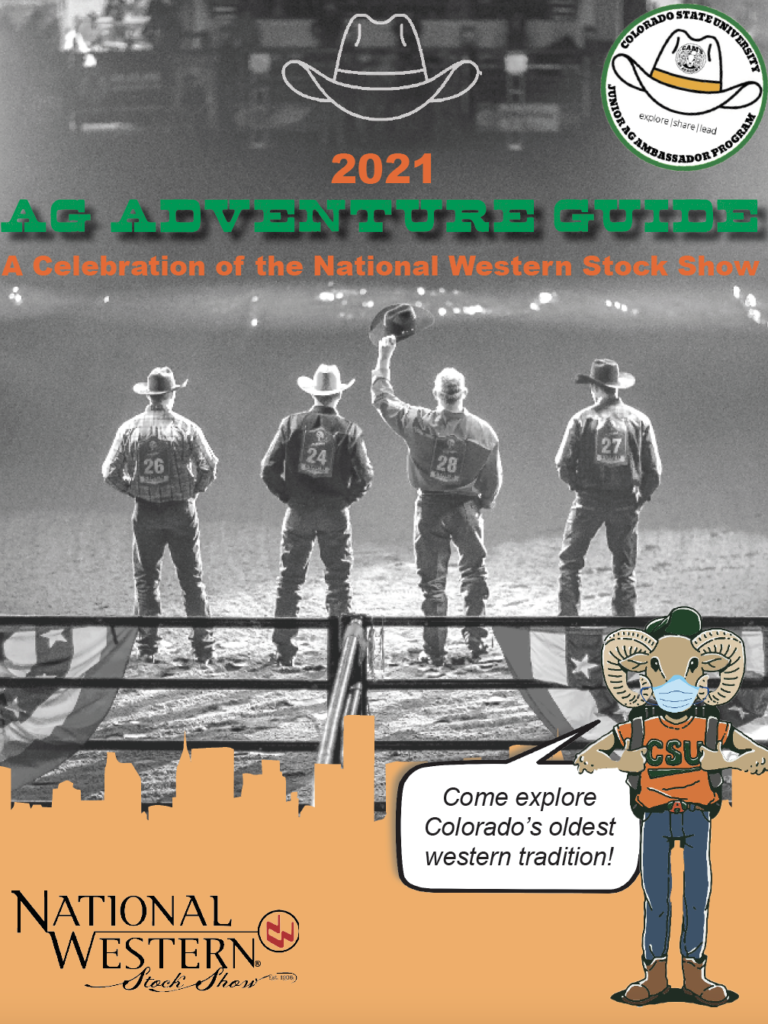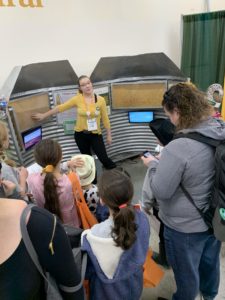 While the 115th National Western Stock Show is postponed until 2022, a popular mainstay of the “Best 16 Days in January” will continue this year in a virtual format. The Colorado State University Ag Adventure exhibit typically draws more than 25,000 visitors each year to its interactive program that teaches kids of all ages about where their food comes from, and about how many agricultural products they use every day.
While the 115th National Western Stock Show is postponed until 2022, a popular mainstay of the “Best 16 Days in January” will continue this year in a virtual format. The Colorado State University Ag Adventure exhibit typically draws more than 25,000 visitors each year to its interactive program that teaches kids of all ages about where their food comes from, and about how many agricultural products they use every day.
The popular education program continues this year through a printable Ag Adventure Guide that includes fun activities and challenges that correlate with the days of the stock show, Jan. 9-24.
CSU students get creative
In partnership with the NWSS, local teachers and agricultural leaders, students in CSU’s College of Agricultural Sciences developed 16 days of hands-on activities for families to explore topics like livestock production, animal husbandry, crop production, and land stewardship, as well as history related to the stock show. The guide also celebrates diversity in agriculture in recognition of Martin Luther King Jr. Day, which falls Jan. 18, on the 10th day of the stock show.
Second-year agricultural education and equine science major Jo Smeby helped develop content for the Ag Adventure Guide through a practicum course offered each fall semester by the college.
“This program is so important for younger students because it is hosted in Denver and we see so many school groups and families come through that don’t live in an agricultural community and don’t have that in-depth knowledge about how things work in agriculture,” Smeby says.
Smeby, who herself grew up in Seattle with very little knowledge of agriculture, became engaged in 2019 through an annual Ag Adventure program for Poudre School District third graders at CSU’s Agricultural Research, Development and Education Center (ARDEC) in Fort Collins. When this year’s event was postponed, she knew she wanted to stay involved and continue spreading the message of agriculture.
“I see how important Ag Adventure is for these students because I was one of these students once,” says Smeby. “I didn’t have the opportunity to attend such an event, so oftentimes I really just talk to them like I am talking to a younger me, trying to show her what I missed when I was that age.”
College ambassadors
 Students in the practicum course also train to become ambassadors for the college, lead field trips, and educate the public, and are challenged to educate themselves on nearly every facet of agriculture. Throughout the course, they work with commodity organizations to create the Ag Adventure Guide, which includes coloring pages, games, word searches and other engaging activities.
Students in the practicum course also train to become ambassadors for the college, lead field trips, and educate the public, and are challenged to educate themselves on nearly every facet of agriculture. Throughout the course, they work with commodity organizations to create the Ag Adventure Guide, which includes coloring pages, games, word searches and other engaging activities.
The students say they benefit tremendously from their own learning experience through the course and content development.
“I have benefitted from this program in the biggest of ways,” says Smeby. “After National Western last year and the year that 2020 was, I really started to reevaluate what was important to me, and came to the realization that teaching and working with kids was what was important to me. Ag Adventure opened my eyes to the world of agricultural education and showed me that this is exactly where I belong.”
The 2021 Ag Adventure Guide is available for download on the National Western Stock Show website, and the Ag Adventure program will return to the NWSS in January 2022.
CSU Spur at the National Western Center
In May 2020, the Colorado State University System broke ground on a new Denver campus at the National Western Center. The public campus, dubbed Spur, offers a year-round destination for discovery and educational experiences and will connect people across the state, region and world.
The CSU Spur campus is made up of three buildings focused on food, water and health. The 60,000 sq. ft. Terra building will open in 2022 with a focus on food and agriculture, and serves as a home to urban agriculture research, a K-12 Ag Discovery Center, a public teaching kitchen, a food lab for industry collaboration, and more. The building also includes CAM’s Ag Academy Lab, which provides collaborative agricultural education opportunities for students, teachers and families through problem-based learning kits and pop-up engagement activities.